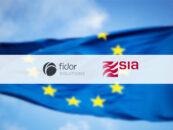Boasting one of the densest network of startups, deepest pools of experienced talent and some of the world’s most sophisticated investors, Berlin is a major tech powerhouse and one of the world’s largest fintech hubs in the world.
The city is home to some 400 fintech companies, or over a third of all fintech companies in Germany. In 2018 and 2019, Berlin accounted for 70% of all fintech funding in Germany, with fintech companies raising approximately EUR 1.8 billion in investment.
Fintech data specialist Findexable ranks Berlin as the second biggest fintech hubs in Europe, and the sixth biggest globally.
Given Berlin’s burgeoning fintech scene, we’ve compiled a list of eight exciting independent startups and scaleups from the city to keep a close eye on. These companies have made notable strides over the past year and are poised for further growth.
N26

Founded in 2013, N26 is a mobile bank serving 7 million customers in 25 markets. With a full European banking license, N26 provides an online banking platform that includes creating and handling current accounts, fixed accounts, insurance, loans, and other banking-related services, enabling customers to manage and control their banking details via a mobile app.
N26 has offices in Berlin, Barcelona, Madrid, Milan, Paris, Vienna, New York and Sao Paulo. It’s the most valuable fintech startup from Berlin, worth US$8 billion, according to CB Insights. The company has raised US$1.6 billion in funding.
Trade Republic

Founded in 2015, Trade Republic is a neobroker licensed by the German central bank and the Federal Financial Supervisory Authority (BaFin). It offers commission-free investing in equities, cryptocurrencies, as well as free ETF and fractional stock savings plans.
Trade Republic serves over one million customers in Europe and is backed by top venture capital (VC) firms including Accel, Creandum, Founders Fund, Project A, Sequoia, TCV, and Thrive Capital.
Trade Republic is currently the second most valued fintech startup in Berlin, valued at US$5.3 billion. It has raised US$986.88 million in funding, according to CB Insights.
Mambu

Mambu is the developer of a banking platform designed to help create, launch, and service loan and deposit products.
The company’s software-as-a-service (SaaS) cloud banking platform powers digital financial services, providing flexible and innovative banking architectures. It’s designed to be composable so that independent engines, systems and connectors can be assembled and re-assembled seamlessly to meet business requirements and the ever-changing demands of customers.
Mambu claims 200 customers in over 65 countries, including N26, OakNorth, Tandem, ABN AMRO, Orange, Zest Money and League Data. It’s worth US$2.08 billion, making it one of the most valuable fintech startups in Germany, according to CB Insights. Mambu has raised over US$179 million in funding.
Wefox

Wefox, formerly Financefox, is a licensed full stack digital insurance company that sells insurance through intermediaries, and which provides digital tools that enable insurance agents to streamline and automate labor intensive processes.
The company, which is present in Germany, Switzerland and Poland, plans to expand into other European markets in the near future, and aims to increase revenues to US$350 million this year, from US$143 million in 2020.
Founded in 2015, Wefox is originally from Switzerland before moving its headquarters to Berlin later on. The company is worth US$3 billion and has raised US$924 million in funding, according to CB Insights.
Solarisbank

Founded in 2016, Solarisbank provides a banking-as-a-service (BaaS) platform. It holds a full German banking license.
Using APIs, Solarisbank allows partners to integrate modular banking services directly into their own product offering. The platform offers digital bank accounts and payment cards, identification and lending services, digital assets, including custody and brokerage, as well as services provided by integrated third-party providers.
In 2021, Solarisbank launched in France, Italy, and Spain to offer local IBANs.
Solarisbank is worth US$1.65 billion and has raised US$420 million in funding from a bluechip shareholder base, including ABN AMRO’s Digital Impact Fund, BBVA, Finleap, Samsung Catalyst Fund, SBI Group and Visa, according to CB Insights.
Raisin DS

Raisin DS is the product of the merger of two of Germany’s largest fintech startups: Deposit Solutions, a business-to-business (B2B) open banking platform in the savings deposit space, and Raisin, a marketplace that offers consumers access to competitive deposit products from all across Europe.
The merger, completed in June 2021, sought to form a leader in the savings and investment market. For savers, the merger meant more product choice and decision power, while for incumbent banks, it meant more implementation options and product access for their own marketplaces. Deposit-taking banks, meanwhile, gained better access to deposit funding.
Raisin DS collaborates with a combined circa 400 banks and financial services providers from more than 30 countries. It’s active in Europe as well as in the US.
Raisin was valued at around EUR 500 million in its last major financial round in 2019, while Deposit Solutions had a valuation of around EUR 1 billion before the merger.
Liqid

Liqid is a digital wealth manager focused on affluent private clients providing them with access to investment strategies and opportunities previously available only to high-net-worth individuals (HNWIs) and institutional investors.
In addition to tailored wealth management from EUR 100,000, Liqid’s offering includes professionally curated portfolios of top quartile private equity, as well as VC and real estate funds from EUR 200,000.
Since 2018, Liqid claims it has doubled its assets under management (AUM) every year and currently manages more than EUR 1.4 billion for its clients. The company is backed by investors including LGT, Toscafund Asset Management, HQ Trust, Project A and Dieter von Holtzbrinck Ventures, and has raised about EUR 120 million in funding, according to data from Crunchbase and Dealroom.
Taxfix

Founded in 2016, Taxfix provides a mobile app that makes use of automation to simplify complicated tax systems and make tax returns accessible to everyone.
The app simulates a conversation with a tax accountant, asking users around 70 simple, personalized questions, each tailored to their unique circumstances. At the end of the conversation, the app tells them what refund they can expect and files the return directly with the government for a fee of EUR 39.99, which is waived if the expected return is less than EUR 50.
Since its launch, Taxfix has helped collect several hundred million euros in tax refunds for customers in Germany, Italy and France. Last year, the company more than tripled its revenue. According to Ophelia Brown, partner at Blossom Capital, the startup could very well reach unicorn status by the end of 2021. It has raised EUR 100 million in funding so far, according to Sifted.






